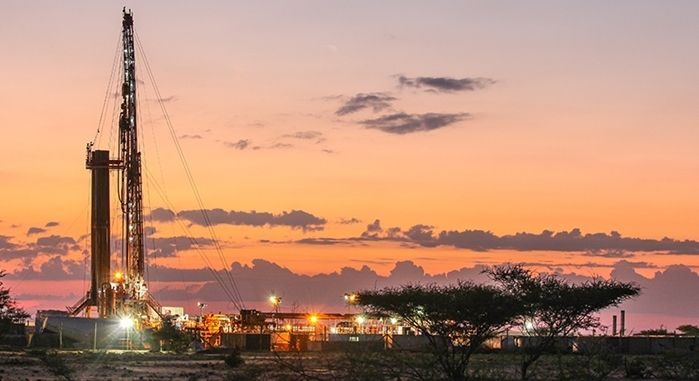British company Tullow Oil is under fire for wasteful spending related to community projects intended to balance the damage done by the company’s oil extraction in the Turkana region of Kenya.
Local campaigners say the projects are worth less than half the amount Tullow claims it has spent on its corporate and social responsibility projects, with residents blaming poor engagement and corruption for the projects’ limited impact.
Tullow has been prospecting for oil in the region since 2012, and recently exported its first 250,000 barrels to a Chinese company for a reported $12 million. Tullow says the company and its partners have so far invested $2 billion into its Kenyan operations. Kenya’s petroleum bill requires companies to divide what it owes to the government – giving 20 percent to local government, five percent to local communities, and 75 percent to central government.
Tullow told the local community it had spent more than $2.5 million on corporate and social responsibility projects in Turkana, Amfry Amoni, head of local advocacy organisation Sustainable Approaches for Community Empowerment (SAPCONE), told DeSmog. But he said SAPCONE analysis revealed projects worth only about $1 million had been implemented in the harsh region, which has just experienced a prolonged drought.
Like what you’re reading? Keep DeSmog investigating by becoming a patron today!
Wrong approach
Amoni accused leaders that worked with company to engage locals of being more interested in winning political seats than helping the region to develop. “A lot of the money has been lost,” he said. “Low community involvement and the wrong approach in reaching out to beneficiaries, and involvement of selfish local leaders, has meant that Tullow corporate social responsibility has had very little impact on the lives of target communities,” he added.
Tullow Oil’s Managing Director, Martin Mbogo, stood by the company’s activities, though he declined to disclose the specific amount Tullow had spent on community initiatives over the past eight years.
“CSR and socio-economic contributions are best measured through impact and outcome,” Mbogo said. He claimed the company had prioritised projects focussing on water and sanitation, health, education, capacity building, environment, and alternative livelihoods.
The company picked which projects to fund through public participation, and often in collaboration with the Turkana County government, local leaders, host community ‘and other development partners’, he said. “This approach ensures that the selected projects do indeed solve a community challenge and that they are sustainable,” he added.
But Amoni told DeSmog it was hard to identify facilities funded by the UK company, especially in the early years of the company’s operations. Most of the money was misappropriated as a result of collusion between Tullow field officials, local leaders and contractors, he claimed.
Ineffective projects
Other residents also claimed Tullow raised significant concerns about the number of projects Tullow was funding, and the way they were being implemented.
Tullow’s Mbogo claimed the company had drilled over 30 water boreholes benefiting more than 20,000 people and over 50,000 herds of cattle, and provided bursaries to over 6,000 students in secondary schools and colleges, besides building three well-equipped hospitals in partnership with Turkana County government. But these claims were contradicted by local community mobiliser Benson Nakua Muya.
According to Muya, a veteran community activist based at Lokichar township, the epicentre of oil production operations, fewer than 10 boreholes had been funded by in Turkana, East, South and Central areas. The 6,000 students who are to get bursaries will do so from a local hospitality firm, African Camp Solutions, a company contracted by Tullow to offer accommodation, catering and related services, he said.
Read more: British Lawyer Interviewed in Wide-Reaching Kenyan Dam Scandal Investigation
African Camp had agreed with the local community trust to channel five percent of its earnings from a bed per night to locals, which will see each of the 6,000 students getting $100 to support their education.
“The Kapese Community Charitable Trust negotiated this deal with the company, and I do not see how Tullow can claim to be part of this. The only time Tullow provided bursaries was in 2012 for 30 students only,” he said.
Tullow was trucking water twice a week to people living along Twiga oil wells Lokori road at cost of nearly $6,000 a month. But that water only lasted a few hours since it was consumed by livestock, Muya said.
“This is what we mean when we say there are better ways of helping people; would it not have been more sustainable to sink a borehole at that cost per month? This arrangement is benefiting the contractor ferrying the water more than the people.”
Muya who in the past has worked for SAPCONE as a mobiliser acknowledged that Tullow seemed to have changed its approach since 2017, to directly engage communities in deciding what to fund. As a result the company has in recent years funded at least 18 community initiatives to the tune of $70,000, representing every well drilled, meaning that $126,000 had been allocated.
Another resident Jackson Nakusa, who previously worked for Tullow as ‘Social Performance’ Manager, but left the company for a failed bid for the county’s senatorial seat in 2017, blamed the apparent lack of tangible development on high cost of implementing projects.
He blamed local contractors for inflating prices of goods and services leading to minimal visibility of work done. “As a CSR adviser I would say that if Tullow has made mistakes, it’s because company is new in Kenya, so we should treat this as a learning experience for the company,” he said.
Main image credit: Tullow Oil
Subscribe to our newsletter
Stay up to date with DeSmog news and alerts






